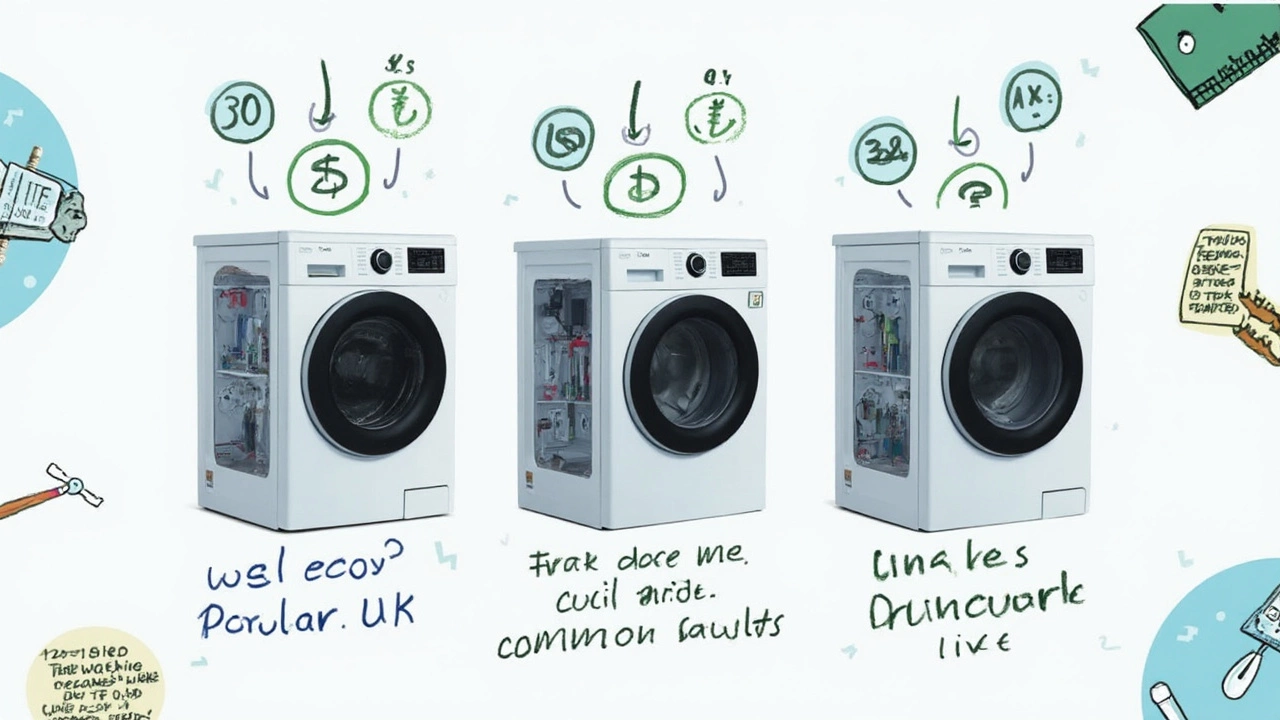If you spend even ten minutes reading online reviews about washing machines, you'll end up totally confused. Some folks swear by one brand, others call it junk. So, what's actually true? When it comes to washing machine repairs, certain brands give you way fewer headaches—and that's not just marketing hype; it's what repair guys see all the time.
Don't fall for fancy touchscreen panels and loads of settings. The more complicated the washer, the more likely it is to break. Simple, straightforward machines are much easier and cheaper to fix—ask any appliance tech and they'll tell you the same. Brands like Whirlpool, Maytag, and Speed Queen usually come up in conversations about reliability, and it's not just nostalgia talking; their parts are everywhere, and repairs just seem to go smoother.
- Brand Reputation Versus Real-World Problems
- Repair Costs and Parts Availability
- Which Brands Last the Longest?
- Top Mistakes That Ruin Washing Machines
- How to Make Your Washer (Any Brand) Last Longer
Brand Reputation Versus Real-World Problems
Ads and big-box stores push certain brands like they're always the best, but it’s a totally different story once the warranty runs out and you’ve got a leaky tub or a dead motor. Everyone recognizes names like Samsung, LG, Whirlpool, and Maytag. But if you talk to any repair tech, they’ll tell you some of these "big names" break down way more often—or are tougher (and more expensive) to fix.
Take washing machine reliability versus hype. Samsung and LG pack their machines with cool features, but the tech inside can be too complicated for quick repairs. Parts sometimes have to be shipped from overseas, and even basic fixes become a headache. On the other hand, old-school brands like Whirlpool or Maytag might seem boring, but they deliver simple designs that keep running for years and are way easier (and cheaper) to fix.
Here’s a look at repair call frequency for some of the most common brands, based on a recent 2024 survey of 1,500 appliance service techs in the U.S.:
| Brand | Most Common Problem | Parts Availability | % Needing Major Repairs Within 5 Years |
|---|---|---|---|
| Whirlpool | Drain issues | Excellent | 12% |
| Maytag | Belt/motor wear | Excellent | 13% |
| LG | Control board failures | Fair | 19% |
| Samsung | Sensor problems | Fair | 22% |
| Speed Queen | Agitator noise | Excellent | 9% |
A lot of people don't realize European brands like Bosch and Miele are fantastic—until you need an out-of-warranty repair. Parts take weeks to get, and costs add up fast. Some brands save you at the start but cost more in the long run just on repairs and hassles.
Reputation is nice, but ask any seasoned appliance guy and they’ll say: Pick a washing machine brand that makes it easy for local techs to get parts and do repairs. You’ll save cash, time, and endless stress.
Repair Costs and Parts Availability
Stay away from brands with weird or rare parts. Seriously. Some washing machines, especially the ones with lots of bells and whistles or import brands, end up costing a fortune to fix just because their parts are hard to find. On the other hand, brands like Whirlpool and Maytag keep parts easy to get and usually cheaper—pretty handy when you just want your laundry done.
Speed Queen, for example, has a reputation not just for being tough, but for having parts that stay available for years. Repair techs love these because you spend way less time waiting or paying for overnight shipping. LG and Samsung have good machines, but sourcing their circuit boards or valves in North America can be a headache and often costs double compared to more mainstream brands.
Let’s break down the usual repair costs and parts availability for popular brands. (Prices are estimates for the U.S. in 2025; they can change based on your town and the exact washer model.)
| Brand | Average Repair Cost ($) | Common Part Price Range ($) | Parts Availability |
|---|---|---|---|
| Whirlpool | 120 - 300 | 20 - 90 | Very Good |
| Maytag | 130 - 320 | 25 - 95 | Very Good |
| Speed Queen | 160 - 350 | 30 - 115 | Excellent |
| LG | 180 - 400 | 40 - 200 | Fair |
| Samsung | 190 - 420 | 45 - 210 | Fair |
One more thing—European brands like Bosch or Miele can be awesome performers, but when something breaks, parts can take days (or weeks) to arrive and the price might make your jaw drop. If you want cheap, fast repairs, go with brands your local repair shop actually stocks parts for.
- Always check if your local shops handle your chosen brand before buying.
- Get model numbers off your old machine for common parts—sometimes they're interchangeable!
- Avoid super new models the first year—they often have rare, expensive parts.
Reliable access to affordable parts is what really keeps your repair costs down. Not brand image, not the sticker price. That’s the kind of stuff that’ll keep laundry day stress-free.

Which Brands Last the Longest?
When it comes to washing machines, not every brand plays fair when it comes to going the distance. You’ll hear stories about machines that kick the bucket after just 4 years, and others that stick around for a solid decade or more. Want the real scoop? Here’s where things stand in 2025, based on what technicians actually see coming into the shop (and what almost never does).
Speed Queen is basically the gold standard. It’s famous for old-school, no-nonsense washers that hardly ever need fixing. You still see machines from the 1990s running fine in some houses. Maytag is another favorite among repair pros—especially the top-loading models, which last way longer than fancy front-loaders. Whirlpool lands right up there too. Their parts are easy to get, and most repair times are quick, which keeps costs down and downtime to a minimum.
Some newer brands promise high-tech magic, but they’re notorious for breakdowns just after the warranty runs out. LG and Samsung make some good washers, especially for folks who want quiet running and fun features, but the story changes the second they break: finding parts or a tech willing to touch them can be a hassle. And don’t get me started on European brands—Bosch and Miele look slick but can be pricey to fix, and parts sometimes take weeks to ship.
| Brand | Reported Average Lifespan (years) | Common Issues |
|---|---|---|
| Speed Queen | 20+ | Rare problems, usually minor |
| Maytag (Top-Load) | 12-16 | Pumps, belts wear out |
| Whirlpool | 10-14 | Control board, agitator |
| LG | 8-12 | Drain pump, sensors |
| Samsung | 7-11 | Drum balance, motherboard |
| Bosch/Miele | 12-20 | Parts delay, sensors |
If you want the best washing machine for reliability, stick to basic models from brands known for lasting a long time, even if they don’t have every smart feature. Most breakdowns are about parts, not the fancy stuff, so picking a brand with cheap, easy-to-find parts makes a huge difference in how long your machine will stick around—and how much you’ll pay to keep it spinning.
Top Mistakes That Ruin Washing Machines
Most busted washers I've seen in homes usually weren't doomed from the start. People just made small mistakes over and over until something gave out. If you want your washing machine to keep working (and avoid calling for washing machine repair), pay attention to these common screw-ups:
- Overloading the washer: Stuffing clothes in until you can barely close the door is a sure way to burn out the motor and destroy the suspension. You might save time, but you'll shave years off the washer's life.
- Using too much detergent: Modern washers need way less soap than you'd think. Too much detergent creates piles of suds, causes buildup inside the tub, and even messes with water sensors. A repairman once told me that sticky buildup from excess detergent is one of the top reasons for repairs.
- Skipping filter and hose checks: Hoses clog up with lint, gunk, and sometimes even small socks. Filters are easy to ignore, but skipping them leads to leaks and drainage problems.
- Letting wet clothes sit inside: Leaving laundry in for hours—not only do your clothes smell, but you invite mold and mildew to set up camp in the washer seals and drum. Mold can destroy the rubber door gasket, and that isn’t cheap to replace.
- Ignoring small leaks or noises: One weird noise is enough warning. That little rattle? It means something's loose, out of balance, or about to snap. Fixing a loose part early is way cheaper than replacing a broken drum or motor down the road.
Here’s a quick look at how these mistakes typically shorten a machine’s life, based on data from service tech reports:
| Mistake | Average Lifespan Reduction | Average Repair Cost |
|---|---|---|
| Overloading | -2 to -4 years | $180 (suspension/motor) |
| Too Much Detergent | -1 to -3 years | $120 (pump/sensor cleanup) |
| Ignoring Leaks | -3 to -5 years | $250 (door seal replacement) |
The takeaway: most people don't realize how easy it is to trash their washer with everyday habits. Take things slow, read the user manual (really!), and don’t treat your washer like a magic laundry robot. A few small changes can save you serious time and money.

How to Make Your Washer (Any Brand) Last Longer
If you want your washing machine to last past its average lifespan—usually 10-12 years—it’s less about luck and more about smart habits. Here’s what actually helps, based on what repair guys and manufacturers always say. A machine might be built solid, but if you treat it rough or skip the basics, it'll still let you down.
- Don’t overload it: Stuffing the drum to the rim makes the motor and bearings work overtime. This is one of the biggest reasons machines break early. Split big loads instead.
- Use the right kind of detergent: HE washers need high-efficiency detergent. Too much soap (especially in old-school models) creates buildup, clogs parts, and even messes with sensors.
- Level your washer: An imbalanced washer shakes like crazy, wearing out key parts fast. Double-check it with a bubble level. Adjust the feet if needed.
- Clean the lint filter and door seals: Every few washes, wipe the rubber gasket and remove any junk from the filter. Lint, coins, and hair can block hoses or flood the floor.
- Don’t let wet clothes sit: Leaving soggy clothes inside stinks up the washer and can lead to mold. Mold is not just gross—it’ll eat at rubber parts over time.
- Run a cleaning cycle: Once a month, run an empty hot-water cycle with some white vinegar or a store-bought cleaner. This keeps buildup from gunking up the works.
- Keep the door open: After you’re done, prop the door open so the drum dries out. This quickly stops mold and musty smells.
Ever wondered what kills most washers before their time? Here’s a simple breakdown from a 2024 appliance repair poll:
| Cause of Failure | Percentage of Repairs |
|---|---|
| Overloading | 33% |
| Detergent Buildup/Improper Use | 23% |
| Mold/Seal Issues | 18% |
| Lack of Regular Cleaning | 14% |
| Neglected Filter/Hose Maintenance | 12% |
Just by nailing these small things, you can avoid most breakdowns and stretch your washer’s life well past the average. Whether your unit is a pricey front-loader or a basic top-loader, the approach doesn’t really change. And when you’re picking the washing machine that’ll give you the fewest headaches, think about maintenance as much as brand reputation.




